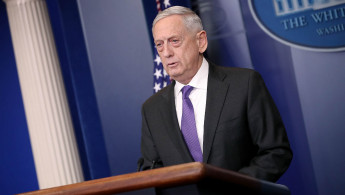Iran's navy has 'stopped provoking' US ships
There have been no "unsafe and unprofessional" actions by Iranian naval forces in the Gulf since that time, said William Urban, spokesman for the US Naval Forces Central Command.
Prior to August, Iranian ships had periodically made high-speed approaches to US vessels that Washington considered dangerous provocations.
Urban declined to speculate on the reason for the change.
"It seems like they've absolutely made a conscious decision to give us more space," he said. "That is definitely a change in their behaviour."
Urban made the comments while travelling with US Defence Secretary Jim Mattis during a stopover in Bahrain to meet with senior government officials there.
The last provocation occured on 14 August 2017, when an unarmed Iranian drone shadowed the USS Nimitz aircraft carrier. US officials say the drone came within 300 metres of F-18 fighter jets, putting the lives of US pilots at risk.
In the first eight months of 2017, the US Navy recorded 14 instances of what it deemed were Iranian provocations. Thirty-five were recorded in 2016 and 23 in 2015.
The incidents at sea typically involve the Revolutionary Guard, a paramilitary force that reports to Supreme Leader Ayatollah Ali Khamenei. Some analysts believe the incidents are meant in part to squeeze President Hassan Rouhani's administration after the 2015 nuclear deal.
In 2017, the worst incident occured when 10 US sailors were captured and held overnight for straying into Iran's territorial waters.
Iranian forces in turn accuse the US Navy of unprofessional behavior, especially in the Strait of Hormuz, the mouth of the Persian Gulf, through which a third of all oil traded by sea passes.
US-Iran tensions are seen to have worsened since President Donald Trump won office. The US president has repeatedly threatened to withdraw the US from the Iran nuclear deal.
The recent sacking of US Secretary of State Rex Tillerson and replacement with Iran hawk Mike Pompeo suggests a harder US line on Tehran.
On Wednesday, Iranian newspaper Javad suggested that Tillerson's firing signals the end of the nuclear accord.
Follow us on Twitter: @The_NewArab





 Follow the Middle East's top stories in English at The New Arab on Google News
Follow the Middle East's top stories in English at The New Arab on Google News
![Israeli forces ordered bombed Gaza's Jabalia, ordering residents to leave [Getty]](/sites/default/files/styles/image_330x185/public/2176418030.jpeg?h=a5f2f23a&itok=_YGZaP1z)

